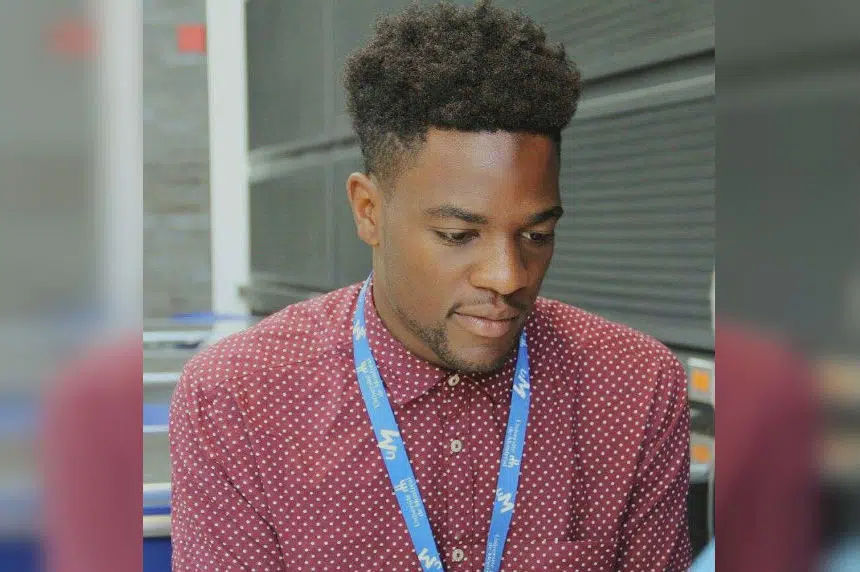Christian Mbanza knows social media is a significant force.
He learned that lesson again earlier this year when photos of him unlocking his own vehicle were posted to social media by one of his neighbours.
“Just happened on Keller Ave,” the Facebook post about Mbanza read. “Watched the whole thing happen. Lock your doors!!”
The post made in late May, just days after George Floyd was killed by a police officer in Minneapolis, is not the first time Mbanza has encountered racism.
“I look at racism as kind of a complex set of behaviours. They can range from really subtle to more obvious,” Mbanza said.
“I’ve kind of learned to internalize it and kind of roll with it but this time around, it was different.”
Mbanza is a school teacher in Regina. He says racism can take several forms, including racism against an individual, such as what happened with Floyd; systemic racism, found in policies and organizations; and every-day racism, which can range from glances and gestures to misinformed passing comments.
The racism Mbanza sees regularly is this subtle, every-day type, so when Floyd’s death at the hands of a white police officer hit social media, Mbanza knew he needed to speak out.
Despite negative experiences online in the past, Mbanza chooses to see the positive that can come from social media in circumstances such as this.
“It has honestly created a lot of conversations,” Mbanza said. “Some of it (is) uncomfortable conversation, but at the same time, it has been a good spark for conversation and hopefully it can create impactful change.”
Since Floyd’s death, protests around the world advocating for Black lives and rampant social media posts have shared a powerful message of unity with the Black community by people from all walks of life.
Social media platforms such as Facebook, Twitter and Instagram have become places for people to have hard conversations, particularly about race.
“People are a lot more willing to say their opinion over social media,” Mbanza said. “I see that as a positive because you’re able to spin that into a conversation, whereas in person, it’s a lot tougher to express your opinion because of the lashback you may receive.
“I think people can take the time to formulate their thoughts more (because) in person, it’s much more uncomfortable to do that.”
Mbanza said Floyd’s death brought significant awareness to the issue of racism in the United States and Canada, and social media has been a key vessel for the spread of information and support.
“I think it has been able to educate people on systemic racism in Canada especially,” Mbanza explained.
“People are able to see the numbers and not only just the numbers but the events that actually happened in Canada. People are being educated on that. And also, on the complexities of race, people are being educated on that as well and are having tough conversations trying to create that change.”
Mbanza said he first found out his neighbour had posted his photo to their neighbourhood Facebook group after his friends sent it along to him. At first, he was uncomfortable.
“There’s an entire negative to social media,” he said.
But then he started to read the post’s comments.
“All my friends who were part of that group chat were able to come to my defence,” Mbanza said. “I think that speaks to the bigger issue that there’s an entire community and everybody is willing to come together to create a change.
“The positive that came from that is kind of what I like to see in social media … There’s an entire community that kind of rallies and comes to the support of the person. That person happened to be me.”
Mbanza said he was never worried by the post because of the immediate support he received online. It’s that openness and community strength that gives Mbanza more hope when he goes online.
But the active and engaged online environment Mbanza sees hasn’t been fostered without help.
“Because of COVID, I think a lot of people were able to sit down and really see what it was like,” Mbanza said.
“George Floyd isn’t the first situation like this that has happened … I think people were really able to sit down and take it in, not really have anything to do but sit down and focus on that situation alone and focus on how bad it really was.”
Mbanza thinks the Black Lives Matter movement may be experiencing a push beyond any other time because of the effects of coronavirus around the world.
“I think that’s the difference from this movement as opposed to prior movements, is people are more willing to stay persistent and stay engaged as opposed to just being a fad,” he said. “People are wanting to see real change when it comes to anti-racism.
“People are able to sit down and actually take things in.”
As a Black Canadian, Mbanza doesn’t know if this will result in lasting change, but months after Floyd’s death, he holds onto hope for the best.
“It’s creating conversation and now that we’re having conversation, what’s the next step?” he asked. “What are we doing to combat the racism that has been seen by all these people of colour? And are we actually willing to take those next steps to make the changes that are necessary?”
Those changes, in Mbanza’s opinion, include more racial representation in workplaces and other areas of society.
“I think the way we represent people of colour influences the behaviours and thoughts of our society,” he said.
“I think this is now the moment in history where we can now create the change we want to see in the future … And I think that’s the impact social media can have.”
The key, Mbanza believes, is pushing against the trend of social media existing in the moment, and instead focusing on creating an ongoing conversation.
“That’s the goal,” he said.







